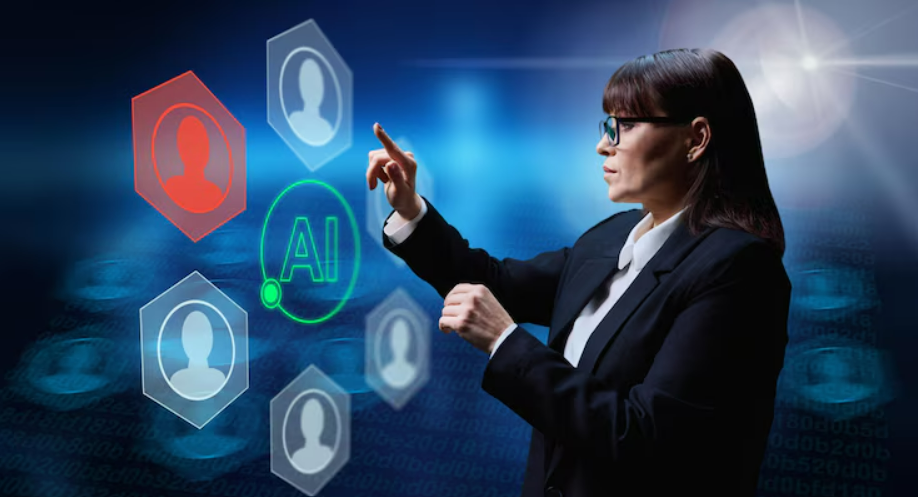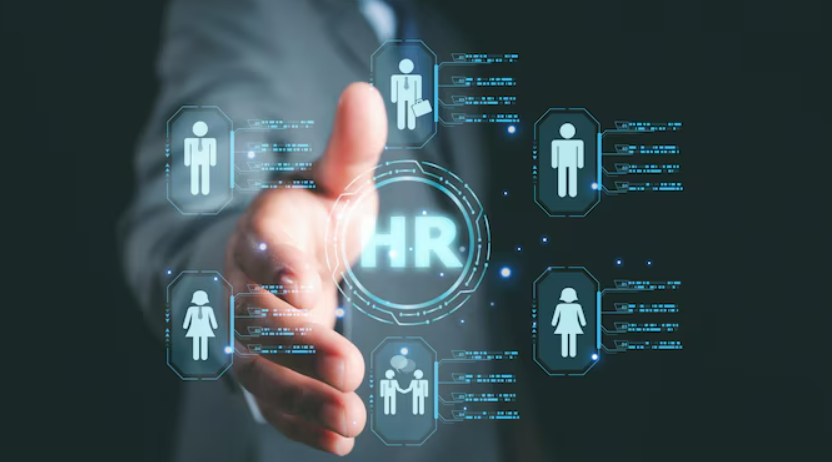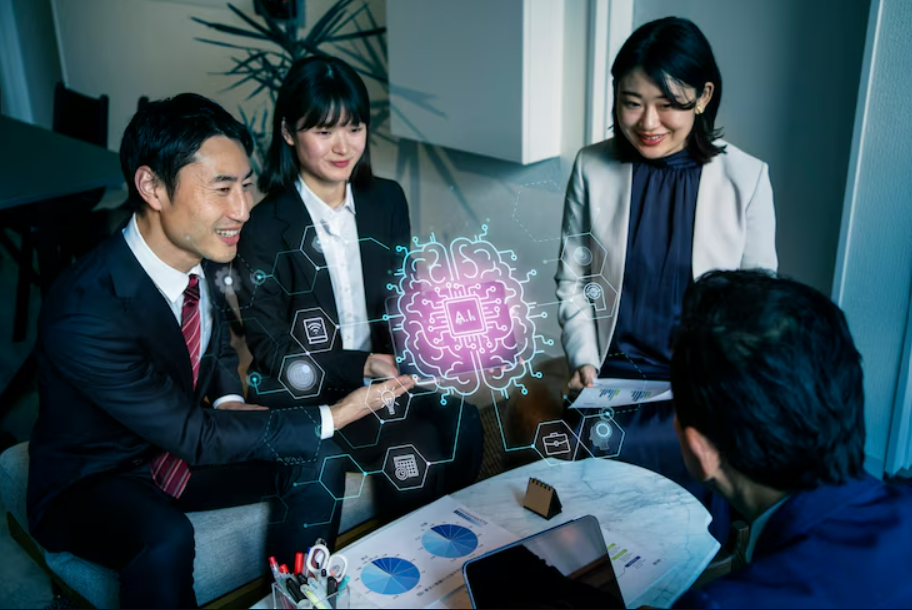The use of AI in human resources continues to expand. According to a survey conducted in 2024, nearly half of HR professionals reported that integrating AI into HR functions had become an increasing priority over the past year. Follow-up research from the same organizations indicates that this trend has only continued to accelerate.
Several factors contribute to this momentum. AI technologies simplify and enhance HR processes. Tools such as AI-powered recruitment platforms and predictive workforce analytics enable organizations to streamline operations and make more informed decisions.
This article explores the key areas where AI is transforming HR, offers practical use cases, discusses the growing role of generative AI, examines potential challenges and ethical considerations, and highlights resources to support AI-related skill development in HR.

Defining AI in Human Resources
Artificial Intelligence in HR involves leveraging technologies such as machine learning, natural language processing, generative AI, and automation to enhance and streamline human resource functions. These tools assist HR teams in managing repetitive tasks, analyzing large data sets, and delivering more tailored and efficient employee experiences.
The Impact of AI on HR Operations
Human resources departments manage substantial data and face multifaceted decision-making demands. AI supports these functions by automating administrative tasks, generating actionable workforce insights, and freeing HR professionals to concentrate on higher-value, strategic priorities.
Advantages of AI-Enabled HR Processes
AI enhances operational efficiency, minimizes human bias, and elevates the overall employee experience. By automating routine administrative tasks, it allows HR professionals to concentrate on strategic initiatives and employee engagement. Additionally, AI supports data-driven decision-making, promotes more equitable hiring practices, enables more effective workforce planning, and facilitates personalized career development pathways.
The Evolving Role of AI in Human Resources
AI is transforming the HR landscape by streamlining operations, enhancing decision-making, and delivering more tailored employee experiences. It empowers HR teams to operate more efficiently while driving improved outcomes for both employees and the organization. The following are key domains where AI is making a notable impact:

Recruitment and Talent Acquisition
Attracting and securing top talent remains a critical challenge for HR departments. In fact, a 2025 survey of over 1,000 professionals revealed that 65% of companies are leveraging AI in their hiring processes. AI supports recruitment by generating job descriptions, automating resume screening, ranking candidates based on suitability, and conducting preliminary interviews via AI-driven chatbots. Additionally, predictive analytics aids hiring managers in making informed, objective decisions—reducing bias and significantly enhancing recruitment efficiency.
Employee Engagement and Retention
A poor hiring decision can cost up to 30% of an employee’s first-year salary, making talent retention just as critical as recruitment for reducing costs. AI-powered sentiment analysis enables HR teams to monitor employee engagement levels and detect early signs of dissatisfaction, allowing for proactive intervention. Additionally, generative AI can create personalized career development plans by leveraging existing employee data, supporting more meaningful and tailored growth opportunities.
Performance Management and Workforce Analytics
AI-enhanced tools assist in tracking employee performance by setting goals, providing real-time automated feedback, and identifying potential performance risks. Meanwhile, workforce analytics solutions enable HR leaders to anticipate talent gaps and begin workforce planning in advance. These tools can analyze patterns such as seasonal fluctuations to forecast future hiring needs, ensuring the organization remains agile and well-staffed.

Learning and Development
AI enhances employee training by delivering personalized learning experiences. Adaptive learning platforms tailor content to an individual’s progress and learning style, increasing training effectiveness and engagement. Additionally, AI-powered systems can match employees with mentors based on aligned skills, career aspirations, and learning preferences.
For the most effective delivery of AI-generated, customized training programs, using a specialized Learning Management System (LMS) is recommended. While AI offers significant benefits, it can occasionally generate inaccurate or inconsistent information highlighting the importance of using trusted, purpose-built platforms.
HR Automation and Regulatory Compliance
In the financial sector, 68% of firms view AI as a strategic priority for managing risk and ensuring compliance. AI streamlines routine HR operations such as payroll, benefits administration, and document handling. Furthermore, AI-enabled compliance tools help organizations remain aligned with evolving labor laws and regulations. These tools allow HR teams to adjust policies in response to regulatory changes and instantly assess their compliance status—particularly valuable when managing employee benefits and maintaining legal adherence.
Applying AI in HR: Five Practical Use Cases
This section outlines actionable ways AI is currently enhancing various human resource functions. Achieving many of these benefits often requires the integration of multiple AI technologies, such as HR management systems, learning platforms, and generative AI tools. When selecting your next AI-enabled HR solution, prioritize systems that offer compatibility and integration ideally through a public API to ensure seamless connectivity. Below are five key use cases demonstrating how AI can be effectively applied in HR:

1. AI in Recruitment and Hiring
- AI-Powered Applicant Tracking Systems (ATS): These platforms automatically filter and prioritize candidates based on job-specific criteria.
- Resume Screening and Candidate Ranking: AI uses natural language processing and predictive models to evaluate resumes and match candidates to roles.
- AI Chatbots for Candidate Engagement: Chatbots manage initial communications, answer frequently asked questions, schedule interviews, and send updates in real time.
- Predictive Analytics for Hiring Decisions: By analysing historical hiring data, AI can forecast candidate success, aiding in more informed, data-driven recruitment and reducing turnover.
2. AI in Employee Engagement and Retention
- AI-Driven Sentiment Analysis and Surveys: Tools analyse feedback from surveys, internal emails, and communication platforms to gauge morale and flag potential issues early.
- Personalized Career Development Plans: AI tailors development paths using insights from employee performance, interests, and skills.
- Internal Mobility Tracking: AI identifies internal talent ready for advancement by assessing skillsets, experience, and growth trajectory.
- Generative AI for Communications and Policy Drafting: AI can generate employee recognition messages, internal announcements, or policy documents. For sensitive materials like HR policies, specialized tools should be used to avoid misinformation.
3. AI in Performance Management and Workforce Analytics
- Predictive Performance Insights: AI analyzes historical performance trends to help managers anticipate challenges and provide timely support.
- Automated Goal Tracking and Feedback: AI-driven platforms monitor progress toward objectives and deliver real-time feedback.
- Workforce Planning and Forecasting: AI helps HR leaders anticipate skill shortages and proactively address talent gaps through strategic planning.
4. AI in Learning and Development
- Personalized Training Programs: AI recommends learning content tailored to each employee’s current needs and skill gaps. Many LMS tools can automate course assignment.
- Adaptive Learning Platforms: These platforms adjust training modules dynamically to accommodate different learning styles and paces.
- AI-Powered Mentorship Matching: AI connects employees with mentors who align with their professional goals and development needs.
5. AI for HR Automation and Compliance
- Document Processing and Summarization: AI streamlines the handling of HR documents by organizing, categorizing, and summarizing them.
- Payroll and Benefits Automation: AI automates payroll calculations, tax deductions, and benefits administration—especially useful for startups using integrated platforms.
- Compliance Monitoring: AI continuously tracks changes in labour laws and internal policies to help HR maintain compliance. However, due to the risk of AI generating inaccurate outputs, human oversight remains essential.

AI in HR: Key Challenges and Considerations
While AI offers significant efficiencies in human resources, it also introduces a range of challenges that organizations must address with care and strategic planning.
Hallucinations and Repetitive Output
A common issue with general-purpose AI tools is the generation of content that may sound plausible but lacks relevance or accuracy for HR-specific needs. To mitigate this, organizations should prioritize specialized solutions such as dedicated HR policy generators, learning management systems (LMS), and applicant tracking systems (ATS) that integrate seamlessly with onboarding workflows. These tools help reduce errors and ensure content remains relevant and trustworthy.
Additionally, over-reliance on AI-generated, generic communications such as mass candidate emails—can negatively impact employer branding. Candidates who perceive messages as impersonal or automated may feel undervalued, diminishing their overall experience and interest in the company.
Ethical Risks and Algorithmic Bias
One of the most pressing concerns with AI in HR is the potential for bias. Since AI models are trained on historical data, they may inadvertently perpetuate existing inequalities in areas such as hiring, promotions, and performance evaluations. To safeguard fairness, HR teams must regularly audit AI tools, use diverse and representative datasets, and adopt fairness-aware algorithms that promote equitable decision-making.
Data Privacy and Regulatory Compliance
AI applications in HR often involve processing sensitive employee data, making privacy and security critical. Regulations like the GDPR and CCPA require companies to maintain transparency around how personal information is collected, stored, and used by AI systems.
To ensure compliance, organizations should implement robust data security protocols and clearly communicate with employees about how their data is managed. Where applicable, consent should be obtained before processing employee information through AI systems.
Strategic Implementation of AI in HR
The most effective way to adopt AI in HR is through trusted platforms that already embed AI functionality. HR teams are encouraged to begin with lightweight, AI-enabled tools such as automated resume screening and gradually scale to more advanced solutions that support broader system integrations.

Leveraging AI in HR Through Specialized Software
AI is transforming key HR functions from recruitment and engagement to compliance and workforce planning by streamlining manual tasks, enhancing data-driven decision-making, and enabling more personalized employee experiences.
However, like any emerging technology, AI presents challenges. Issues such as ethical implications, data security, and algorithmic bias require HR teams to approach implementation thoughtfully. The most effective use of AI lies in augmenting not replacing human judgment and expertise.
As AI continues to evolve, its influence on HR will only grow. Professionals who actively explore and adopt AI tools today will be best equipped to lead and innovate in the future of human resources.
